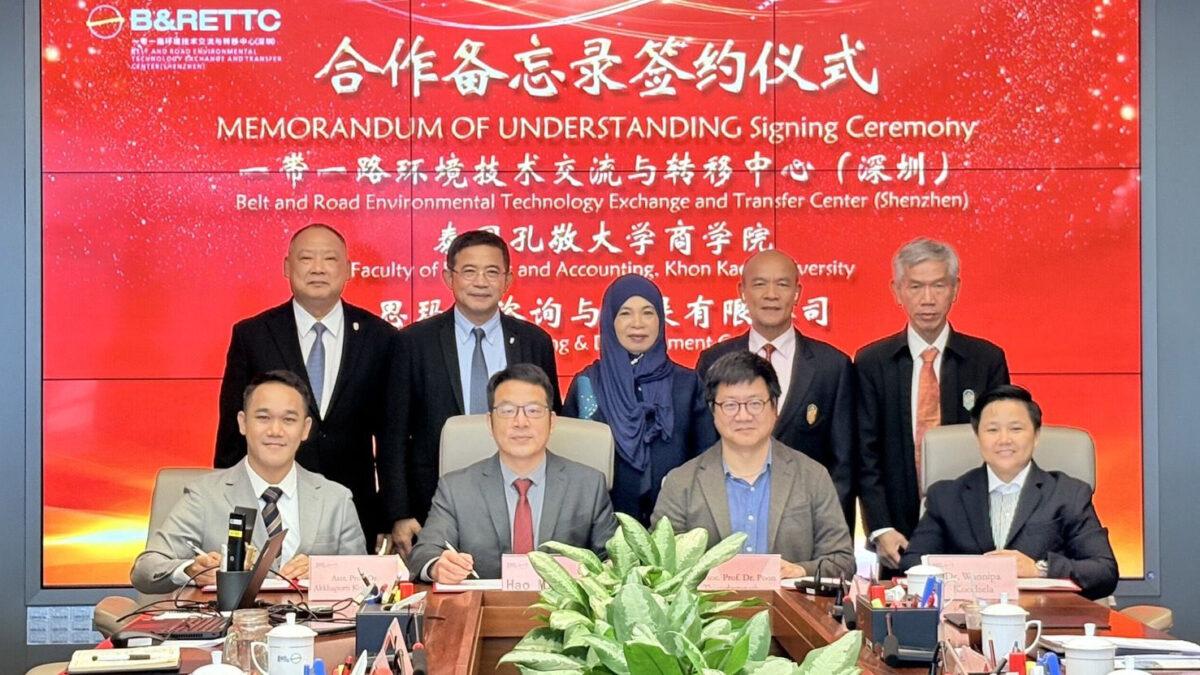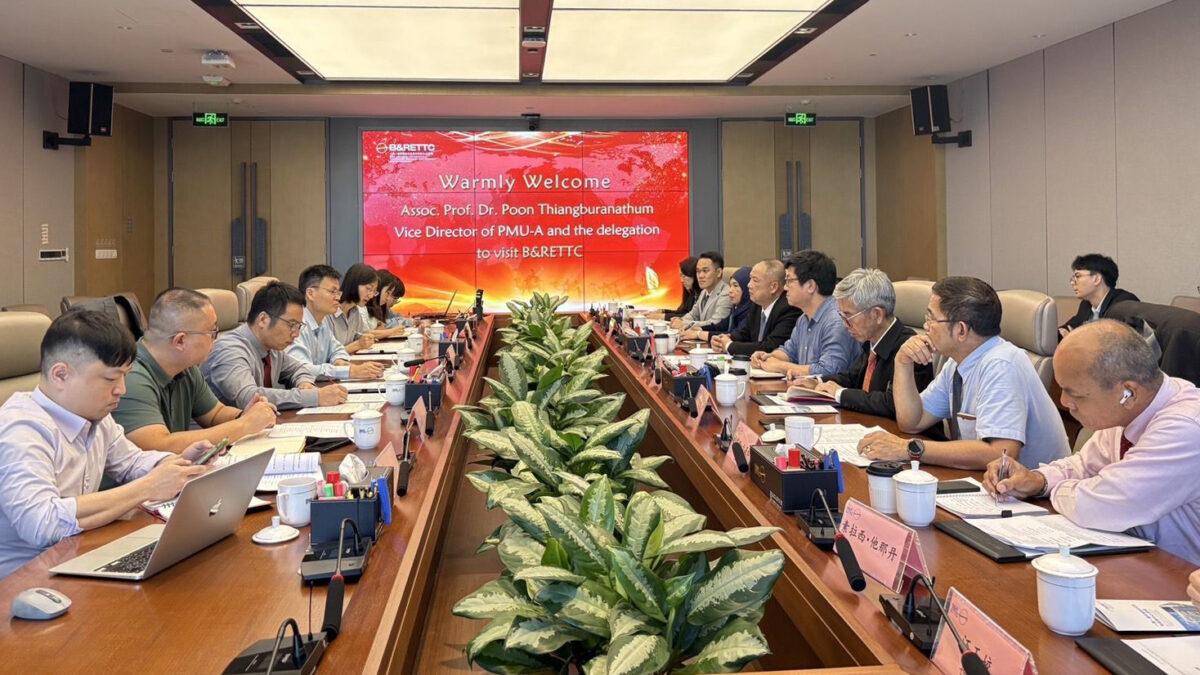On June 16, 2025, the Faculty of Business Administration and Accountancy at Khon Kaen University (KKBS), in collaboration with Smart Consulting and Development Co., Ltd., signed a Memorandum of Understanding (MOU) with the Belt and Road Environmental Technology Transfer Center (B&RETTC) in Shenzhen, China. This agreement forms part of the broader Belt and Road Initiative and focuses on digital platform development to promote green investment and sustainable low-carbon city models. The signing ceremony was attended by executives from all three organizations.

The agreement was signed by key representatives including Asst. Prof. Dr. Akkhapol Kokkankamphu, Principal Investigator of the research project titled “Developing New Trade and Investment Policies to Support Economic Corridors Between Thailand and China” from KKBS; Dr. Wannipa Kudsila, the lead researcher and platform developer; Assoc. Prof. Dr. Poon Thiengburanathum, Deputy Director for Planning and Strategy at PMU A; and Mr. Hao Mingtu, Director of B&RETTC, China.
This collaboration aims to foster the transfer of green technologies and environmental innovations between Thailand and China. B&RETTC will serve as the primary organization for technology transfer, while PMU A, under the National Science, Research, and Innovation Policy Council of Thailand (NXPO), will support localized innovation and low-carbon city development in line with national policy. The agreement provides a non-binding framework for cooperation in areas of mutual interest, with a focus on academic exchange, business matching, and the promotion of environmental innovation.

The three organizations have also agreed to co-develop a “Thai–Chinese Industrial Investment Platform.” Each party will coordinate with local stakeholders to effectively link the private sector, academic institutions, and government agencies.
Joint activities will include regular business matching events conducted both online and in person. Delegation exchanges will be arranged to open up cross-border trade and investment opportunities. One of the major joint efforts will be the development of a digital platform that showcases green technologies and projects. This will enable public engagement through digital means.
The division of responsibilities within the collaboration is clearly defined. B&RETTC will provide the technical infrastructure and support for the platform. KKBS will integrate the technology into its academic and training programs. Smart Consulting and Development Co., Ltd. will coordinate with local businesses to manage user-side data. PMU A will work to ensure the platform aligns with regional development policies and encourage adoption in targeted cities and communities across Thailand.
Asst. Prof. Dr. Akkhapol Kokkankamphu explained that China’s current Belt and Road vision emphasizes high-quality projects, particularly in green innovation and the development of model cities like Shenzhen. The goal is to create a complete innovation ecosystem linking government, industry, academia, media, and finance to position the city as a center of green and low-carbon technologies.
He further stated that the research project is aimed at designing new models for trade and investment policy through close collaboration with Chinese government agencies and academics. These models will address Thailand’s needs in terms of geography and technological development, especially in clean energy, environmental management, and low-carbon industries. Collaboration with B&RETTC, known for its expertise in green technologies and business incubation, will also help establish a green investment platform, facilitate business matching and training, and build a green technology database and certification system for Thai–Chinese entrepreneurs.
Dr. Wannipa Kudsila, the lead platform developer, emphasized that the unique value of this platform lies in its integration of Thai knowledge with Chinese technology. The team is closely coordinating with the Board of Investment of Thailand (BOI), the Industrial Estate Authority of Thailand (IEAT), and green technology centers in China to ensure that investment is targeted and sustainable. The platform is designed to serve as a “strategic investment bridge” between Chinese investors and economic opportunities in Thailand. It operates through four main mechanisms: an online portal to disseminate investment information, a training curriculum co-designed by Thai and Chinese experts, field visits to real project sites and industrial zones, and business matching events that pair Chinese investors with pre-qualified Thai projects.
Assoc. Prof. Dr. Poon Thiengburanathum, Deputy Director for Planning and Strategy at PMU A, who also served as a witness to the signing, noted that area-based research plays a crucial role in empowering local businesses to grow within an economy connected to capital, technology, and international cooperation. This will help expand trade and investment opportunities and raise environmental awareness among Thai entrepreneurs.
Mr. Hao Mingtu, Director of B&RETTC in Shenzhen, highlighted the role of his organization as a key partner in China–Thailand cooperation. The center is committed to promoting the transfer of green technologies from China to Thailand by working with local businesses, government agencies, and academic institutions. The ultimate goal is to drive the practical development of low-carbon cities and enhance environmental cooperation at the regional level.
This collaboration represents a clear strategic direction toward building a Thai–Chinese cooperation ecosystem that integrates economic mechanisms with sustainable innovation. It combines Chinese knowledge, technology, and capital with Thailand’s local context and needs. Furthermore, it supports long-term environmental sustainability and climate resilience while driving investment in environmentally friendly directions.














